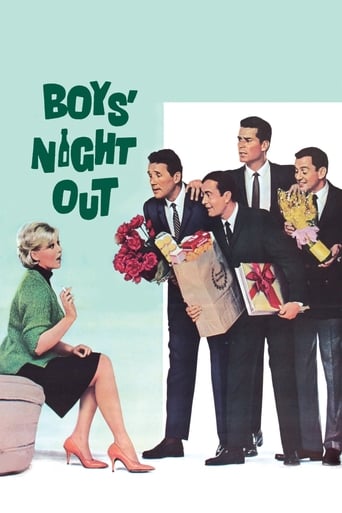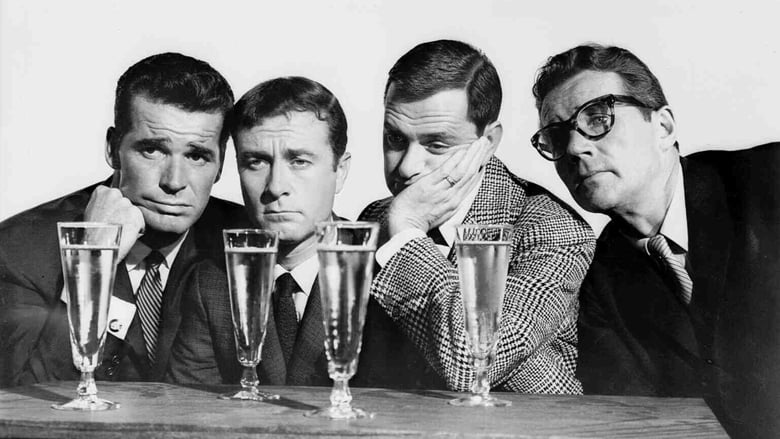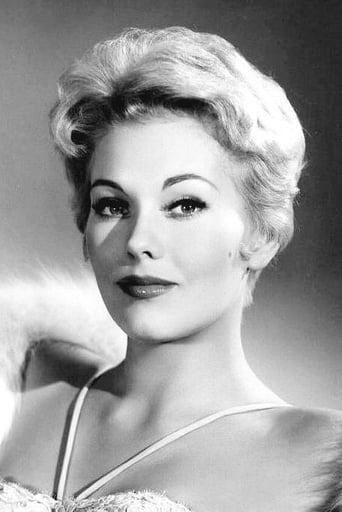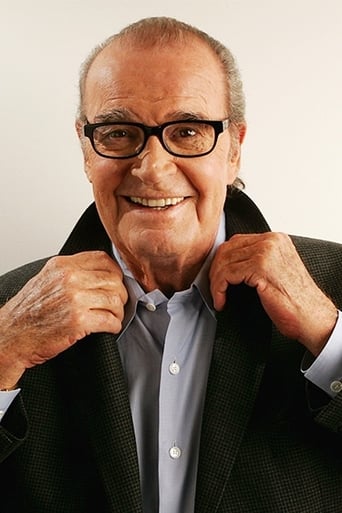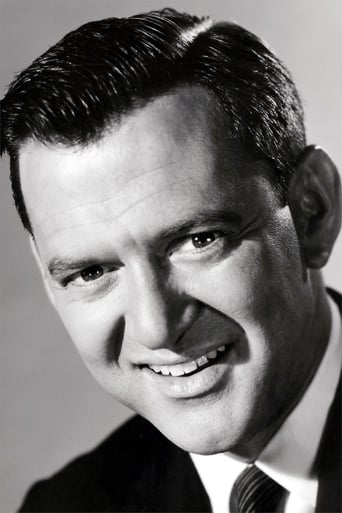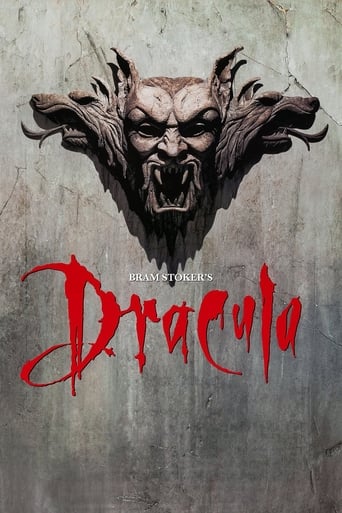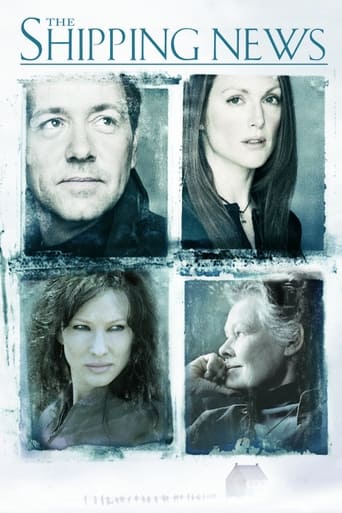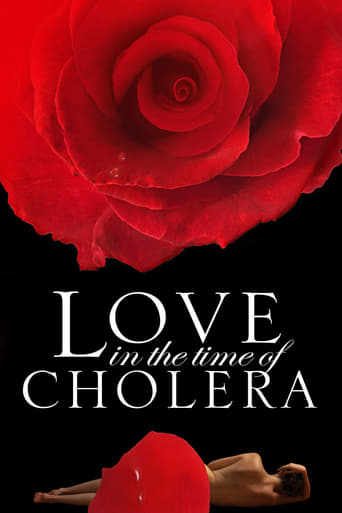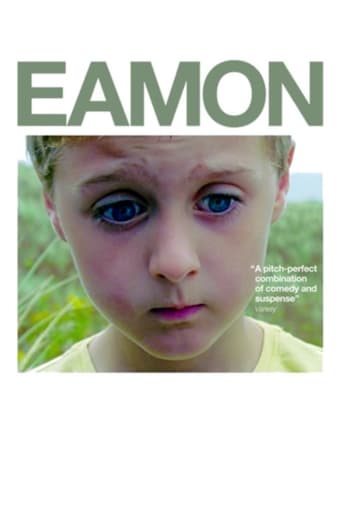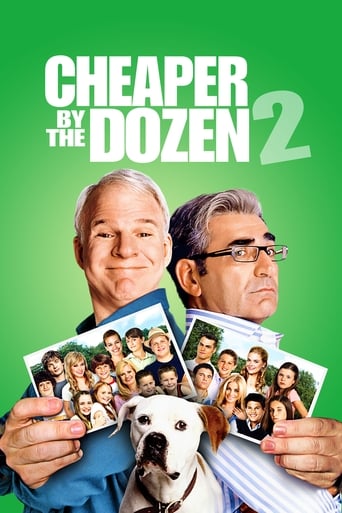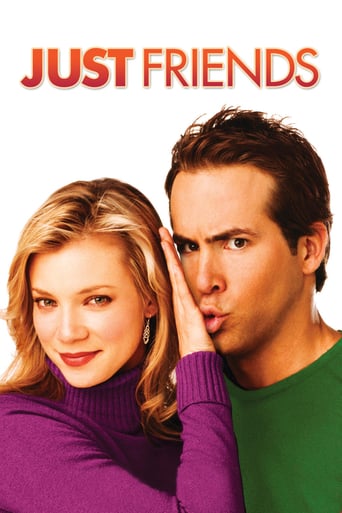Boys' Night Out (1962)
Fred, George, Doug and Howie are quickly reaching middle-age. Three of them are married, only Fred is still a bachelor. They want something different than their ordinary marriages, children and TV-dinners. In secret, they get themselves an apartment with a beautiful young woman, Kathy, for romantic rendezvous. But Kathy does not tell them that she is a sociology student researching the sexual life of the white middle-class male.
Watch Trailer
Cast


Similar titles
Reviews
Simply Perfect
The film never slows down or bores, plunging from one harrowing sequence to the next.
The acting in this movie is really good.
The story, direction, characters, and writing/dialogue is akin to taking a tranquilizer shot to the neck, but everything else was so well done.
Copyright 20 April 1962 by Filmways/Kimco/Embassy Pictures. Released through Metro-Goldwyn-Mayer. New York opening at both the Victoria and Guild: 21 June 1962. U.K. release: July 1962. 115 minutes. SYNOPSIS: Four men rent a New York apartment for a sociology student who is writing a thesis on the American male.COMMENT: It's rather nice to be able to fully agree with all one's colleagues for once. In fact we had the grand idea of writing a joint review, but our editors, alas, could not see the light. This coy, non-sex "comedy" sinks almost irretrievably into the quicksands of thanks-but-no-thanks, thanks to the miscasting of glum, non- personable, far-too-old James Garner as chief "boy". Oscar Homolka is also a dead loss (although it's not his fault, it's his lousy lines), but Tony Randall makes a game attempt to rescue the movie by over-acting with style. He even manages to bring off a mildly amusing running gag. Indeed, except for Garner, and Homolka all the players strive their utmost to lighten the ship from the dead weight of a witless, clumsy script. Even normally lackluster Howard Duff contributes to the entertainment and there nice guest appearances by Jim Backus and William Bendix. Anne Jeffreys from "Zombies in Broadway" still looks great, while Patti Page zings out the title tune with all the elan of a Doris Day. Although forced to make a late entrance, Miss Novak looks absolutely delicious. Slinking around in a variety of becoming costumes, she even manages to partly offset Michael Gordon's sluggish, slow-paced, elephantine, non-inventive direction. Mr. Gordon's ability to handle CinemaScope is zilch. All he can up with are TV-style close-ups – and mostly single close-ups of dreary Garner at that!
Directed by Michael Gordon, with a story by Arne Sultan and Marvin Worth, an adaptation by Marion Hargrove and a screenplay by Ira Wallach, this 1960's style romantic comedy is lightweight fun. It stars James Garner, Tony Randall, Howard Duff, and Howard Morris as four New York businessmen, and co-commuters from Greenwich, who pitch in to rent an inexpensive bachelor pad for their first and future liaisons and end up getting a high class apartment complete with a beautiful blonde, played by Kim Novak; she's a sociology graduate working on her doctorate thesis "the adolescent sexual fantasies of the adult urban male". Garner's character is divorced and lives with his mother (Jessie Royce Landis)Every Thursday night, bachelor Fred Williams (Gardner) spends his evening after work with three fellow commuters from Connecticut: advertising executive George Drayton (Randall), investment specialist Doug Jackson (Duff), and accountant Howard McIllenny (Morris). Each of these others have wives, the latter two also have children. None of them gets any respect at home: Fred's mother Ethel (Landis), with whom he lives, pesters him about marrying again; George's wife Marge (Janet Blair) can complete his sentences without listening to what he's saying; Doug's wife Toni (Anne Jeffreys) is the perfect housewife who's raising perfect children and is always concerned with keeping up appearances, so she won't let him fix things around the house on weekends; and Howard's wife Joanne (Patti Page) feeds their three growing boys like "kings" while she forces her husband to diet with her. The men have grown bored of bowling and other activities such that they've been hanging out at Slattery's (William Bendix) bar on Thursdays instead. One night Fred's boss (Larry Keating) enters to pick up a redhead he's going to take back to his in-town apartment. This gets the bridge playing commuters to talking about setting up just such an arrangement for themselves.Naturally, Fred is elected to find the ideal place for these planned affairs. Not really wanting to be party to such an arrangement, Fred takes his boss's advice to "shop" for a place way out of their $200/month price range in order to tell his friends that he'd tried, but he couldn't find a place. Unfortunately, Fred visits a pricey apartment that the manager (Jim Backus) hasn't been able to get rid of, because a famous model (?) had committed suicide (or been murdered) in it. Backus is funny as he tries to convince Garner's character to "take my (apartment), please". He calls George to tell him the "good" news and instructs him to tell the others to meet him there after work. George says that the next thing they'll need Fred to do is to arrange for a 25 year old blonde to "outfit" it. Fred refuses saying that advertising is George's business and if he can't figure out how himself, perhaps he should put an ad in the paper. Fred starts drinking while waiting for his friends to arrive; they're late because George didn't believe that Fred could have found the perfect apartment for only $200. Meanwhile, the doorbell rings and when Fred answers it, he's greeted by Cathy (Novak). The film's funniest scene follows - a slightly inebriated Fred believes that Cathy has answered George's ad and Cathy, curious for her own as yet to be disclosed reasons, decides to stay and then play along once she sizes up Fred's friends.On cloud nine, the three married men enthusiastically discuss who gets which night while Fred looks uncomfortable. They also devise stories to tell each of their wives as to why they're giving up their Thursday night with the boys but still need one night a week for creative education in their respective fields. Cathy phones her sociology professor Dr. Prokosch (Oscar Homolka) to tell him she's figured out a way to write her thesis about men. He warns her against the danger of these men really wanting to "get physical" with her, but she tells him that "good girls" like her are experts at avoiding such entrapments. Fred actually visits Cathy on Sunday to discuss his discomfort with what she's getting herself into, and the seeds of a romantic relationship between the two of them are planted. On Monday night, Cathy is able to tap into George's true desire to have someone listen to him. On Tuesday night, Cathy has appliances and other household items for Howard to fix, and on Wednesday night she's cooked a dozen things for Howard to eat. Hence, she maintains platonic relationships with each of them, and they're too scared to admit to the others that "nothing happened". Ruth McDevitt plays a nosy neighbor who thinks she lives next door to a brothel. Obviously, she sees and hears (innuendo) more than what's going on, which she reports to her husband (not credited).Meanwhile, the wives are happy with their husbands "out of the blue" shows of affection until Ethel tells them that their men are probably being "skunks". She recommends that they hire a private detective, Mr. Bohannon (Fred Clark), to learn the truth, which they do. Fred is struggling with his feelings for Cathy, given the kind of girl he thinks she is, and commiserates with Slattery. Dr. Prokosch suspects that Cathy is enamored with Fred and also suggests that she interview the men's wives to get "both sides of the pillow" for her thesis. Bohannon investigates. Fred eventually figures out what he wants and finds out that Cathy wants him as well. He invites her to Greenwich where he's the little league baseball coach of his friend's kids. This sticky situation leads to an eventual showdown with everything coming to a head in the zaniest of ways at the apartment, with all the major characters and a couple of the minor ones. The resolution is predictable. The final scene includes Zsa Zsa Gabor as Fred's boss's latest squeeze.
A feather weight comedy boasting a large cast but precious few laughs. Four men (three henpecked husbands and James Garner) rent a New York City crash pad with a plan for each of them to entertain women once a week. The apartment is sublet to student Kim Novak (as a PhD candidate?), who proceeds to study the four as part of her sociological thesis. It's a slim plot and not much happens save for actors like Tony Randall, Howard Morris and Howard Duff making fools of themselves over Novak. The film is not helped by the fact that Novak (in a role screaming out for the likes of Judy Holliday or even Doris Day) has very little chemistry with Garner. It's directed by Michael Gordon and the script was worked on by Ira Wallach, who would later co-write the very witty HOT MILLIONS. The cast also includes the likes of Patti Page, Jim Backus, Janet Blair, Oskar Homolka, Jessie Royce Landis, Anne Jeffreys and Fred Clark. There's a throwaway cameo by Zsa Zsa Gabor.
Boys Night Out (whose title now sounds like a double entendre) was one of a number of early sixties comedies that show how American culture was shifting even before the advent of the later sixties counter-culture. James Garner plays Fred Williams, a handsome and weak-willed young guy henpecked by his mother and bullied by his married buddies on the commuter train to Manhattan. Kim Novak plays Cathy (do we ever learn her last name?), a sociology grad student whose dependence on her father-figure of a professor mirrors Fred's on his mom. Fred and his married pals, who want to have affairs on the side, rent a garishly decorated apartment (vacated by a call girl) and "trick" Cathy into renting it. Cathy, whose dissertation is about the "lives of married men," takes the bait for her own reasons. All the men have problematic (and essentially infantile) relationships with women, including their wives. The wives, on the other hand, are grimly domestic and shrewdly aware of their husbands deficiencies. Looking at the film in retrospect, we can see that Women's Lib is just around the corner. It turns out that the married men simply (or not) want a woman who will listen to their self-centered monologues and Cathy adroitly manages their visits. But she and Fred fall in love and both show that they have the capacity to change, defy their parental figures, and enter into an adult relationship. Even though Fred doesn't know if Cathy's having sex with his friends or not, he wants to marry her. The other couples can only see women in the roles of wives or prostitutes, so naturally they condemn Cathy--but Fred doesn't categorize Cathy, he just loves her. Fred (and his mom, who comes around and appreciates Cathy for who she is) represent the future, where there will be a more nuanced attitude towards marriage and relationships. Cathy's an educated and urbane young woman with great clothes (designed by Novak herself)she'll marry Fred and things won't ever be the same. As the film ends, we see that the men are forced to include the women in their forays into the city at night. They're no longer shutting their wives out (and then complaining about them). Cathy's part of their suburban group now, but she's wearing a snazzy black leather jacket and is obviously still a bit of a hip outsider. There may still be a few more bombshells she's waiting to drop. Ostensibly this film is about the "mind of the married man," but in reality it's all about what women want.

